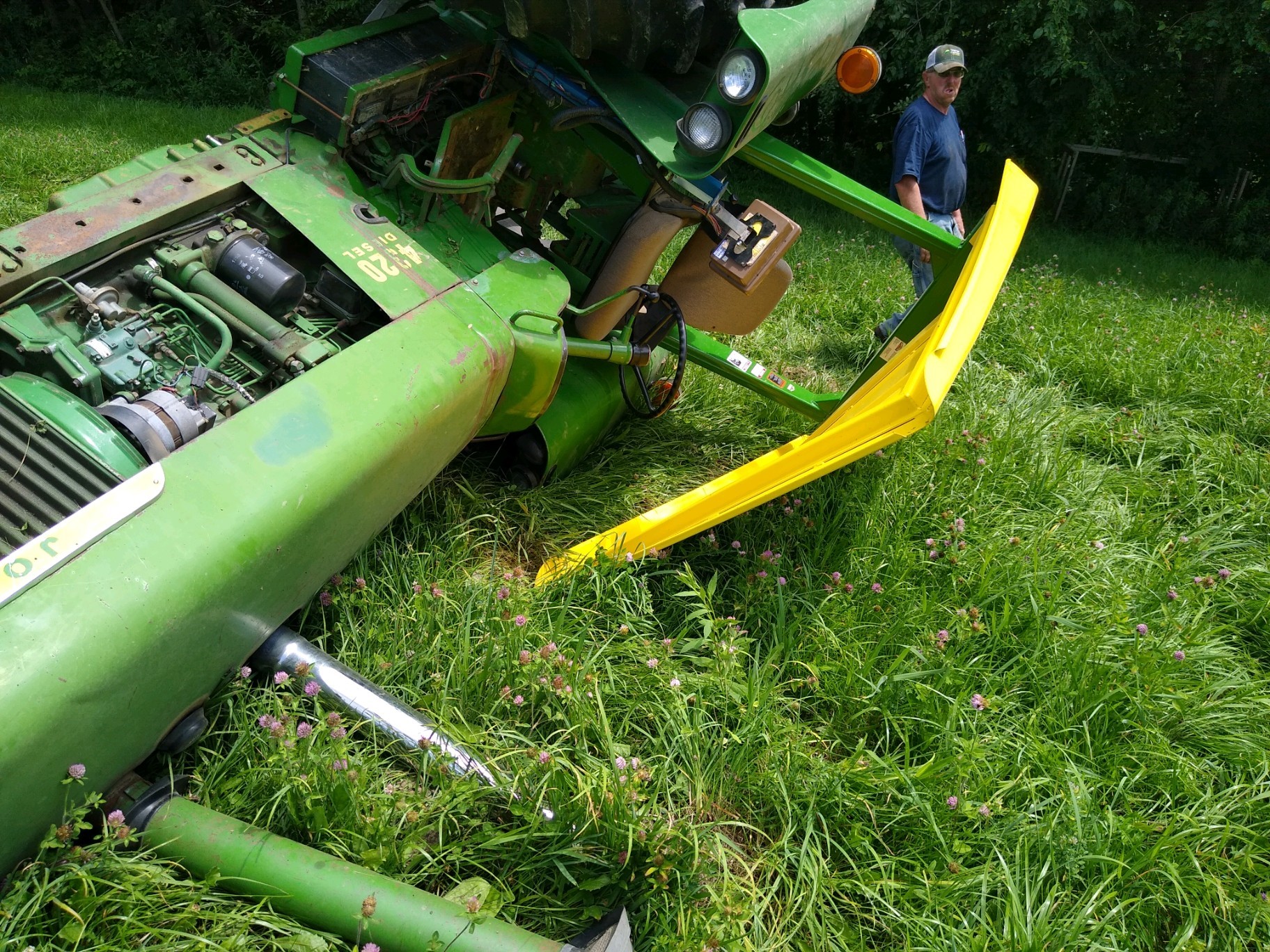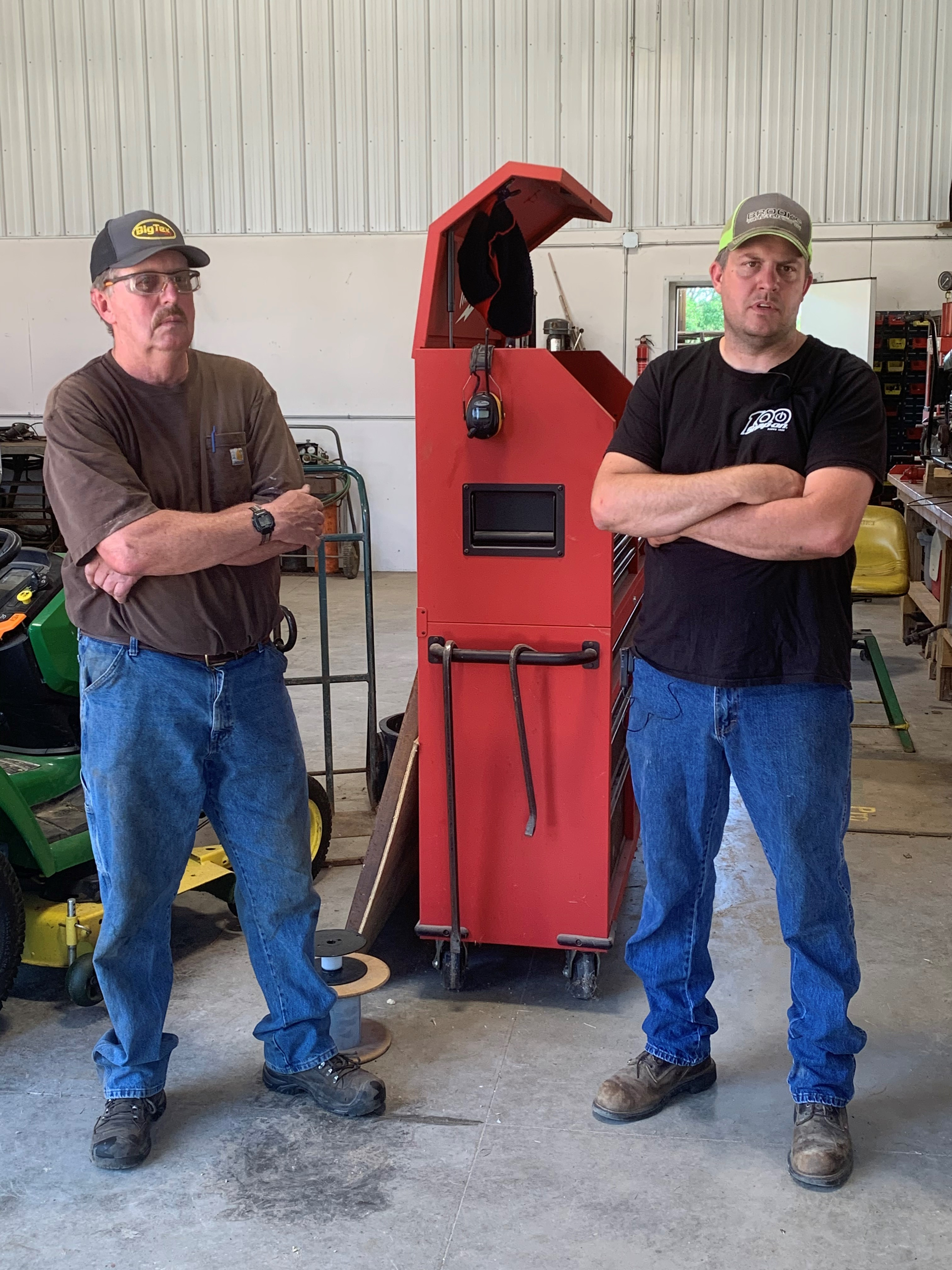 FOR IMMEDIATE RELEASE
FOR IMMEDIATE RELEASE
Oct. 20, 2021
CONTACT: Scott Heiberger
heiberger.scott@marshfieldresearch.org
715-207-1604
Roll bar rebate saves Wisconsin farmer more than money
Holmen man survives tractor rollover without serious injury after retrofitting through ROPS Rebate Program
This article is part of the “Telling the Story Project,” a collaborative effort involving the Upper Midwest Agricultural Safety and Health Center, with funding from the National Institute for Occupational Safety and Health.
BY SCOTT HEIBERGER
HOLMEN, Wis. -- Caleb Orebaugh steered his slow-moving John Deere 4320 straight down the familiar hillside when, suddenly, he felt the weight of the mower start pushing his tractor forward.
“It was during a drought and the ground was dry and hard,” Orebaugh said. “I started sliding and I pushed the brakes, but I didn’t have any traction and kept sliding sideways.”
Orebaugh was losing control.
“When the mower’s tongue caught the rear tire I just hung on.”
Time seemed to slow down as he gripped the steering wheel. The tractor rolled onto its side, stopping when the rollover protection structure (ROPS) hit the ground.
The ROPS!
Orebaugh, 34, had installed it just a few months before the July 2020 incident, becoming the first reported participant in the Wisconsin Rollover Protection Structure (ROPS) Rebate Program to survive a tractor overturn with a ROPS installed through the program.
“I bruised my elbow when it hit the inside of the (sun) canopy, and that was about it,” Orebaugh said.
National data suggest that 1 of every 10 tractor operators overturns a tractor in his or her lifetime. Tractors are the leading cause of death on U.S. farms; the most frequent cause of tractor-related deaths are overturns, nearly 100 per year. Approximately half of U.S. tractors do not have rollover protection.
A ROPS is designed to create a protective zone around the operator. A ROPS, when used with a seatbelt, is 99 percent effective in preventing serious injury or death in the event of an overturn. Even when used without a buckled seatbelt, as was the case with Orebaugh, a ROPS is 70 percent effective.
Seeking shade
Orebaugh’s father, Allan, heard about the Wisconsin ROPS Rebate Program on the radio. The rebate program, started in 2013 by the National Farm Medicine Center, Marshfield Clinic Research Institute, was offering rebates of up to $865 toward the cost of purchasing and installing a ROPS. (The National Farm Medicine Center has since made the program more cost-effective by limiting out-of-pocket retrofit expenses to $500, no matter the cost of the retrofit.) All Wisconsin farmers are eligible. The program is funded through philanthropic support from the Auction of Champions and other generous donors.
“When Caleb called me and told me he’d rolled the tractor, I remember feeling very relieved that six months earlier we put that rollover bar on there,” Allan said. “We had farmed that land for two or three years without one.”
The Orebaughs grow about 100 acres of hay and other crops, and raise a few beef cattle. Both work off the farm. This part of Southwest Wisconsin features steep, rolling hillsides, rocky outcrops and deeply carved river valleys, features that escaped the flattening effects of glaciation during the last ice age.
But it wasn’t the hazardous topography that motivated Allan and Caleb. The ROPS retrofit grew out of a simple desire for sun protection.
“We had talked about getting an umbrella,” Caleb said. “But then we thought, ‘no, it would just get snagged on the trees and wrecked,’ so we thought we might as well look for a ROPS with a canopy.”
“And sure enough,” said Allan, thinking about what might have been.
“The funny thing is,” Caleb said, “that’s not even the steepest part of the farm. I’d always thought if I had a rollover it would be somewhere else on the property, not where it happened.”
The ROPS came from Iron Bull Manufacturing in Indiana, a couple hours west of where the Orebaughs used to farm near Muncie, Ind. Caleb was 14 when Allan moved the family from the flat land of the Hoosier State to the Holmen area.
Caleb, a former mechanic, put the ROPS on himself. He rented workspace at the local John Deere implement dealer to do the job, a dealer where had worked for a dozen years. He now works at the nearby John Deere construction equipment dealer.
Did the ROPS save his life?
“I can’t say for sure, but the roll bar definitely stopped it from rolling further.”
The incident
Unknown to Caleb, a spectator watched as he dusted himself off from the rollover.
“One of the neighbors called her mom and said, ‘I think they just rolled a tractor out here,’” said Allan, relaying a conversation the neighbor had shared with him. “‘Is he OK? Yeah I guess so, he is walking away from it.’”
A shaken Caleb made his way downhill to the farm house, where Allan lives, and called Allan at his place of employment.
“I can’t even remember what I was thinking,” Allan said of the call from Caleb. “You’re just trying to figure out what to do first.”
Once he realized his son was OK, the men’s thoughts turned to the functionality of their only tractor.
“We used the skid steer and a jack, and got a neighbor’s tractor and dragged the haybine out of the way and called a tow truck to roll the tractor back upright.” Caleb said.
One of the rear tires had gone flat so they dragged the tractor down to their workshop.
“I felt lucky that I wasn’t under the tractor, and also lucky that I didn’t completely destroy it,” Caleb said. “There wasn’t anything major wrong with it. Snapped the PTO shaft off the tractor, bent the outer PTO shaft on the haybine, had to straighten the exhaust, and put a new sun canopy on. We were able to do all the work ourselves, other than the rear tire.”
A ROPS normally limits the degree of rollover, thereby reducing damage to the tractor, say engineers. Another reason to retrofit.
Caleb waited to tell his wife, Kara, after she got home from work. She took the news in stride, Caleb said, but thinking about his family, he said that he now buckles his seat belt if he is on the “steeper stuff.” The couple has two children, Emilea 6, and Ian, 2.
Rollovers can happen on flat ground, too
Farms don’t have to be hilly for rollovers to occur, say researchers. It is possible to tip any tractor on flat ground if the turn is short enough and the speed is high enough. Additionally, operators must be alert for ditches, embankments, holes and ramps. Banks of ditches can give way if the tractor is driven too close to the edge.
Most overturns involve the tractor rolling on its side, however tractors also roll over backwards. This can occur when trying to pull out a tree stump, or a piece of equipment stuck in mud. Hitching too high can result in backward tips. For each tractor, consult the operator’s manual for acceptable hitch points.
ROPS are engineered to mount on specific tractor models and designed to operate with the tractor’s mounting brackets and frame. This provides a structure that is flexible, yet rigid enough to withstand the loads produced during a tractor overturn. Prototype ROPS must pass engineered, crush, static, and dynamic tests to assure adequate performance before they are produced for the public. These prototype ROPS must meet the standards set by the Society of Automotive Engineers and the American Society of Agricultural and Biological Engineers.
If a tractor with a ROPS does overturn, the ROPS should be replaced because it is specifically designed to bend to absorb the energy generated by the tractor contacting the ground, engineers say. ROPS are designed and certified to withstand just a single overturn,
Orebaugh said he is considering replacing his ROPS with another ROPS from the rebate program.
Make the call
If you, your family or hired help operates a tractor without rollover protection, make the call today.
To check on retrofit options for your particular tractor, go to the National ROPS Rebate Program website, https://www.ropsr4u.org/. If you are a Wisconsin farmer, click on Wisconsin, or call 1-877-767-7748. Not all states have rebate funds available. When available, funds are applied toward the purchase, shipping and professional installation of the ROPS.
“The process went smoother than I thought,” said Caleb Orebaugh.
Smoother than a ROPS-less overturn.
###
Allan Orebaugh, father of Caleb Orebaugh, at the scene of his son’s overturn in July 2020.
Caleb Orebaugh, right, and his father Allan Orebaugh recount Caleb’s July 2020 tractor overturn.


